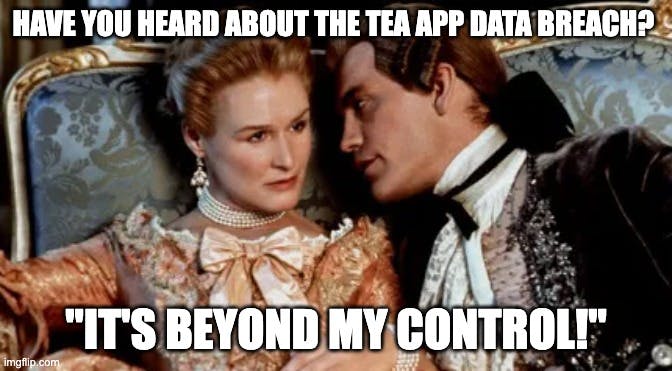“Les Liaisons Dangereuses” is a book that’s just a bit younger than the United States of America. Dakota Johnson was born the same year Dangerous Liaisons won the Oscar for Best Adapted Screenplay.
What “Fifty Shades of Grey” was for the younger generation, “Dangerous Liaisons” was for the older ones. You can’t compare apples with oranges. You can’t compare Glenn Close, John Malkovich, and Michelle Pfeiffer to Dakota Johnson and Jamie Dornan.
You can and should compare human nature through time and the lens of technology. Why? Because dating apps are gossip on steroids. In “Dangerous Liaisons,” the nobles didn’t use apps, but letters for the same purposes. The data breach marked their downfall for the same reasons the Tea app got hacked a few centuries later.
Do Not Sip Tea - Talk Only To Me
If you want to be (absolutely) safe online, stay offline. I know. I know. Don’t roll your eyes. We are all on the same online boat (just like the Titanic), but we aren’t on the same decks. That’s why I’m more worried about my browsing history than my dating (apps) activities.
Let me put it this way before I make my next brilliant point:
- How many dating apps are out there? “There are over 1,500 dating apps and websites operating worldwide at the moment, and this market is projected to reach $9.2 billion by 2025.”
- How many data breaches this month? Year? As many as you want.
- What’s the biggest dating app data breach? It’s not the Tea app. Then, what’s making it so “special?”
Well, I’m not a dating expert. I’m also not a cybersecurity expert, either. Yet, I couldn’t help noticing some interesting conspiratorial moments that made the Tea app “desirable” for hackers.
“The app has angered some men, and prompted a thread Thursday evening on the right-wing troll message board 4Chan, in which users called for a “hack and leak” campaign.”
Why would someone call for hacking and leaking? Well, there’s more than one reason:
“Tea is designed to function as a virtual whisper network for women, allowing them to upload photos of men and search for them by name. Users can leave comments describing specific men as a “red flag” or “green flag,” and share other information about them.”
I’m not saying that “the empire angry men striking back” is justified, but cyber-tea-loving ladies should’ve known better. Clearly, something is going on. There’s more to this story than just another hacking incident. Here’s a screenshot of the official Tea app Instagram page:
These comments speak volumes, don’t they? And, this is only the beginning of the end of whatever we call dating-in-the-age-of-AI.
A Fine Line Between Hacking and Cyberterrorism
“On November 24, 2014, the hacker group "Guardians of Peace" leaked confidential data from the film studio Sony Pictures Entertainment (SPE). During the hack, the group demanded that Sony withdraw its then-upcoming film “The Interview,” a political satire[3] action comedy film produced and directed by Seth Rogen and Evan Goldberg.”
The Tea app became too big for its own good, but still not big enough to prevent itself from failing users. With headlines like these, you’re inviting the cyber-enemies:
“Forget ChatGPT. Tea is the most downloaded app on Apple's App Store.”
“The Tea app was intended to help women date safely. Then it got hacked.”
Am I exaggerating or taking this situation the wrong way? Well, let’s see.
If hacking is about something other than money, then we’re stepping out into the dangerous territory of cyberterrorism. Now, unless I’m writing under the heavy influence of tea mixed with alcohol or suffering from the Mandela Effect (this is the real thing!), “The Interview” became the “forbidden fruit” that was rather consumed at home than in the movie theaters. The message was clear: either you comply or the data leak would make you (Sony Pictures) cry.
The Tea app hackers wanted users to “taste their own medicine” in the most perverted way imaginable. I can tell you first-hand that nobody looks good in verification photos. I have taken these more than once myself. I deleted them as soon as possible. That was the deal with the Tea app. You had to verify that you were indeed a lady, to use the app. The raters are rated in the most shameful ways online.
The gamification and trivialisation of the Tea app situation is sickening and terrifying. I went through this rabbit hole of rating your dates (anonymously), so you don’t have to (reasonably). It turns out that there are countless Facebook (Meta or whatever) groups for these exact purposes. Was it really necessary to “digitize” gossip and put it on steroids? Was the price of sacrificing your most private information worth the opportunity to share your dating “findings” with the world?
What happened to the kiss-and-do-not-tell code the older generations used to live and love by in the pre-social media days? I’m terrified of the big and beautiful social (credit) scoring systems. Now, there’s a new digital scarecrow in town. It’s called the dating score.
It’s wild to write a story that takes wild turns in real time. It seems that the Tea app data leakage is far from over. The second “wave” is even worse. We’re talking about the private messages between the users. Yup, the very core, or heart, or substance of gossiping.
The final scene in “Dangerous Liaisons” is something… Well, you have to see it to appreciate it. It’s a crime that Glenn Close didn’t win an Oscar for this one. But then, there are so many crimes that have gone unpunished.
Il ne faut pas fâcher les vieilles femmes; ce sont elles qui font la réputation des jeunes.
https://www.youtube.com/watch?v=02Vo_Q0nt-k&embedable=true
Feature Image credit: imgflip.com


